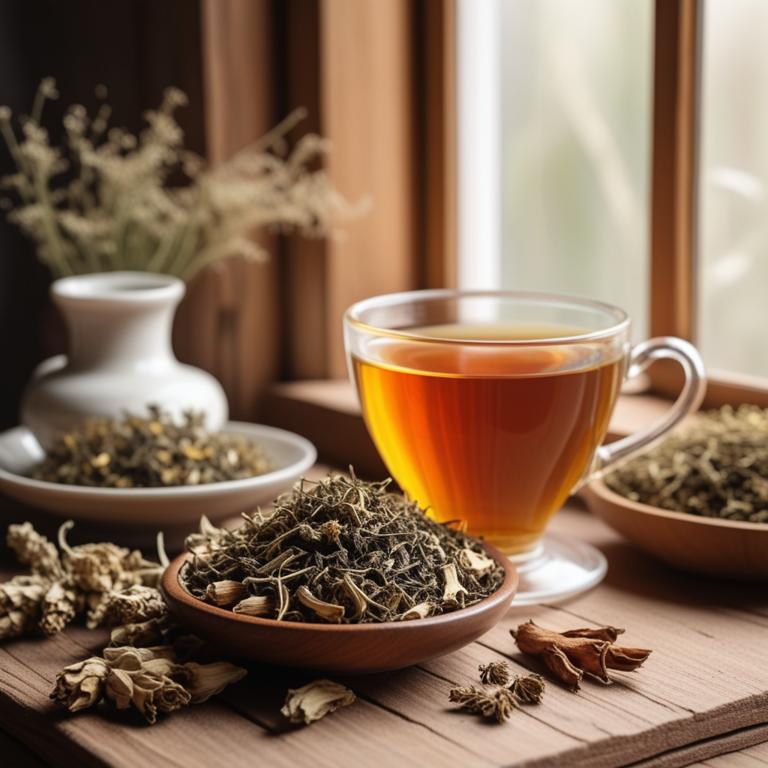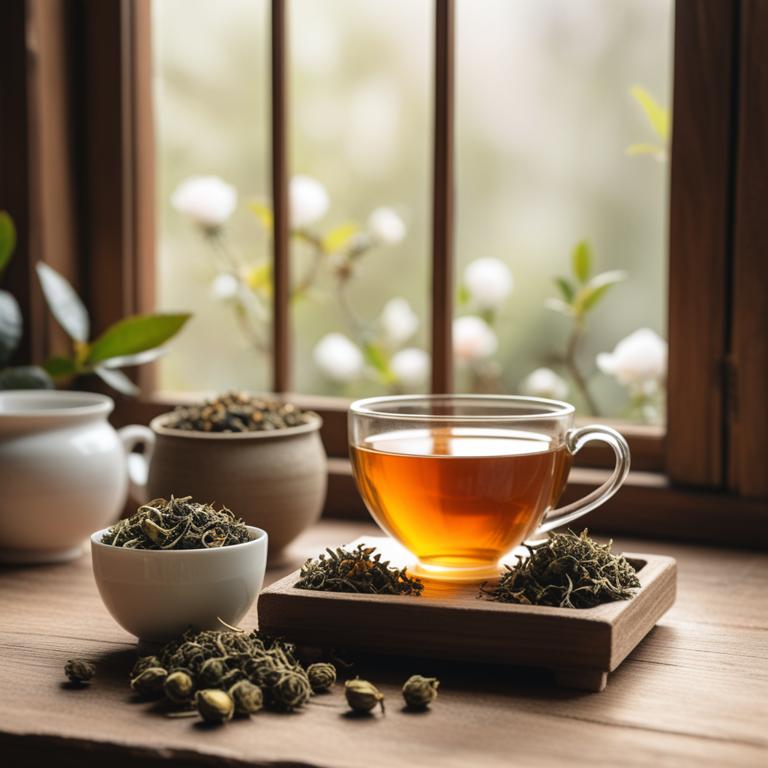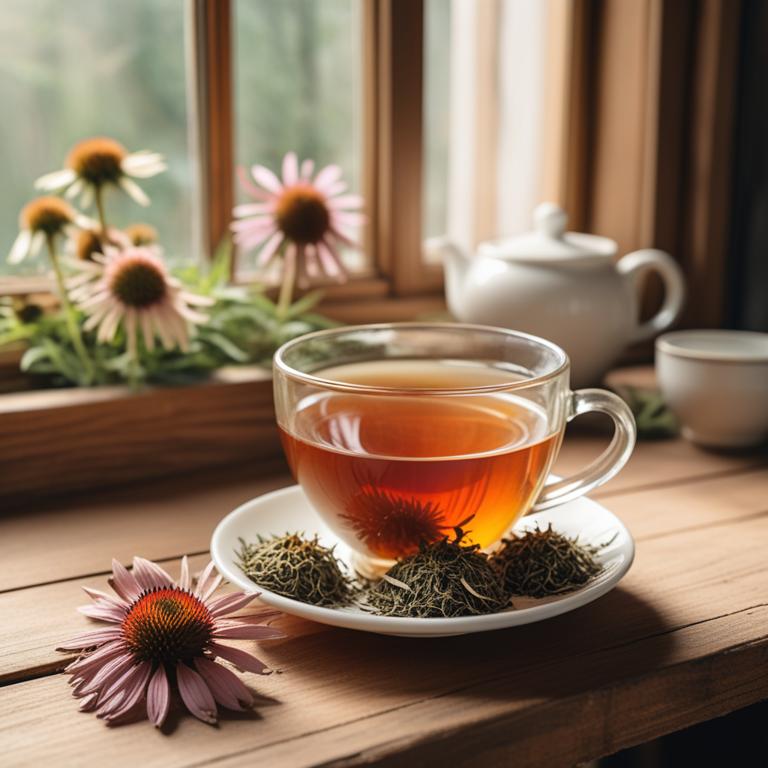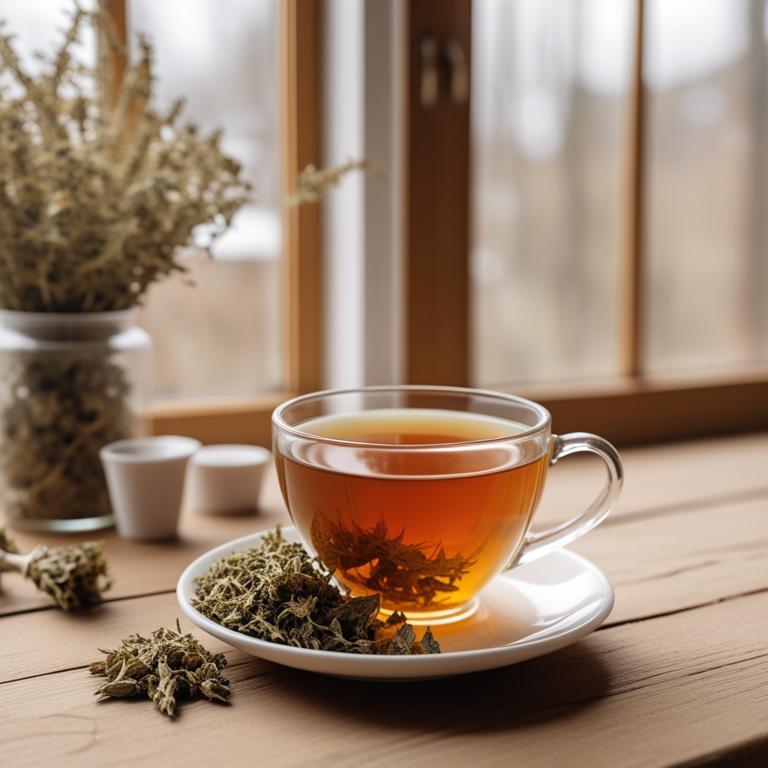7 Best Herbal Teas For Colds

Herbal teas for Colds are a natural and effective way to alleviate the symptoms of colds and flu, defined as teas made from the leaves, flowers, roots, or fruits of various plants, used to promote recovery and well-being.
These teas are beneficial in treating colds as they provide antioxidants, anti-inflammatory properties, and immune-boosting compounds that help to soothe a sore throat, reduce congestion, and ease body aches.
Some examples of herbal teas that can be used to treat colds include Peppermint tea, which helps to clear nasal congestion, Echinacea tea, which boosts the immune system, Ginger tea, which reduces inflammation and soothes a sore throat, and Lemon and Honey tea, which provides a soothing and calming effect.
Additionally, other herbal teas such as Thyme, Sage, and Slippery Elm can also be used to treat colds, as they possess antimicrobial and anti-inflammatory properties that help to fight off infections and promote healing.
According to "Journal of alternative and complementary medicine (New York, N.Y.)", teas for colds containing an echinacea compound were found to be effective in relieving symptoms and reducing the duration of colds, with a significant difference in relief between the experimental and control groups.
Below there's a list of the 7 best herbal teas for colds.
- 1. Eucalyptus globulus teas
- 2. Camellia sinensis teas
- 3. Echinacea purpurea teas
- 4. Glycyrrhiza glabra teas
- 5. Sambucus nigra teas
- 6. Echinacea angustifolia teas
- 7. Hydrastis canadensis teas
Also you may be interested in...
TODAY'S FREE BOUNDLE
Herb Drying Checklist + Herbal Tea Shopping List + Medicinal Herbs Flashcards
Enter you best email address below to receive this bundle (3 product valued $19.95) for FREE + exclusive access to The Aphotecary Letter.
$19.95 -> $0.00
1. Eucalyptus globulus teas

Eucalyptus globulus teas have been traditionally used to treat colds and respiratory issues, thanks to their decongestant and anti-inflammatory properties.
The bioactive constituents of this herbal preparation, including eucalyptol, cineole, and globulol, help to thin mucus, reduce inflammation, and alleviate congestion in the nose and chest.
By consuming Eucalyptus globulus teas, individuals can experience relief from symptoms such as coughing, sneezing, and sore throats, making it an effective remedy for colds and flu.
The benefits of using Eucalyptus globulus teas to treat colds include natural and non-addictive relief, improved respiratory function, and a boost to the immune system.
Related Study
According to "Evidence-based complementary and alternative medicine : eCAM", Eucalyptus globulus teas for colds have been reported to be effective, with a frequency of citation of 6.8% as one of the top-cited plant species used in the treatment of respiratory tract infections.
2. Camellia sinensis teas

Camellia sinensis teas, also known as green tea, have been used for centuries to help alleviate cold and flu symptoms.
The bioactive constituents, including catechins, flavonoids, and theophylline, in Camellia sinensis teas possess anti-inflammatory and antimicrobial properties, which help to reduce congestion, soothe a sore throat, and combat infection.
These properties enable Camellia sinensis teas to treat the cold ailment by boosting the immune system, reducing fever, and relieving respiratory issues.
The benefits of using Camellia sinensis teas to treat colds include its ability to provide a natural and safe remedy, its adaptogenic properties to reduce stress, and its potential to prevent future colds and flu episodes.
Related Study
According to the provided study, Camellia sinensis teas for colds may be beneficial as it has been found to potentially interfere with COVID-19 pathogenesis, possibly through inhibition of virus replication and entry to its host cells.
3. Echinacea purpurea teas

Echinacea purpurea teas have been traditionally used to treat colds and other respiratory infections due to their immunomodulatory and anti-inflammatory properties.
The bioactive constituents, including alkylamides, glycosides, and phenolic acids, help to stimulate the immune system and reduce inflammation in the body, thereby alleviating cold symptoms.
The consumption of Echinacea purpurea teas has been associated with a reduced duration and severity of colds, as well as a decrease in the incidence of respiratory tract infections.
Overall, Echinacea purpurea teas offer a natural and potentially beneficial approach to treating colds, with benefits including reduced symptoms, improved immune function, and a lower risk of complications.
Related Study
According to "Holistic nursing practice", Echinacea purpurea teas for colds may provide a positive risk to benefit ratio when taken as recommended, as they can reduce the total number of cold episodes, days with colds, and the need for additional medication.
4. Glycyrrhiza glabra teas

Glycyrrhiza glabra teas, derived from the roots of the licorice plant, have been traditionally used to treat colds and alleviate symptoms associated with this ailment.
This herbal preparation's anti-inflammatory and expectorant properties help to treat colds by reducing congestion and relieving coughs.
The bioactive constituents of Glycyrrhiza glabra teas, including glycyrrhizin, flavonoids, and saponins, work together to soothe the throat, ease sinus pressure, and combat viral infections that cause colds.
The benefits of using Glycyrrhiza glabra teas to treat colds include reduced severity and duration of symptoms, improved respiratory health, and a natural alternative to over-the-counter medications.
Related Study
According to "Mini reviews in medicinal chemistry", Glycyrrhiza glabra teas for colds have been found to modulate the immune system, inhibit virus growth, and produce anti-inflammatory activity.
5. Sambucus nigra teas

Sambucus nigra teas have been widely used as a natural remedy to treat colds and flu due to their antiviral, anti-inflammatory, and antimicrobial properties.
This herbal preparation helps to treat the colds ailment by alleviating symptoms such as congestion, cough, and sore throat, thereby providing relief to the patient.
The bioactive constituents of Sambucus nigra teas, including flavonoids, phenolic acids, and essential oils, work synergistically to boost the immune system and reduce the severity of cold and flu symptoms.
The benefits of using Sambucus nigra teas to treat colds and flu include its ease of preparation, affordability, and minimal side effects, making it a popular choice among individuals seeking a natural and effective remedy.
Related Study
According to "Phytotherapy research : PTR", Sambucus nigra teas for colds may offer some protection and alleviation of disease symptoms as well as promoting general well-being due to their documented immunomodulatory, immunostimulatory, and anti-inflammatory effects.
6. Echinacea angustifolia teas

Echinacea angustifolia teas have been traditionally used to treat colds and flu due to their immune-boosting properties, which help to combat the underlying infection.
This herbal preparation works by stimulating the immune system to produce more white blood cells, which then attack and eliminate the invading pathogens.
The bioactive constituents of Echinacea angustifolia, including alkylamides, glycosides, and phenolic acids, are responsible for its immunomodulatory and anti-inflammatory effects, which help to alleviate cold symptoms such as fever, congestion, and cough.
By consuming Echinacea angustifolia teas, individuals can benefit from its ability to reduce the duration and severity of colds, as well as its potential to prevent future infections.
Related Study
According to "The Cochrane database of systematic reviews", Echinacea angustifolia teas for colds may be beneficial as some preparations containing extracts of Echinacea were found to be better than a placebo in the prevention and treatment of the common cold.
7. Hydrastis canadensis teas

Hydrastis canadensis teas, also known as goldenseal, have been traditionally used to treat the common cold and its associated symptoms.
The anti-inflammatory and antimicrobial properties of this herbal preparation help to alleviate congestion, cough, and sore throat by reducing the production of mucus and inhibiting the growth of pathogens.
The bioactive constituents, including berberine and hydrastine, exhibit immunomodulatory and antiviral activities that help to boost the immune system and combat viral infections.
As a result, goldenseal teas can provide relief from cold-related symptoms and support overall well-being by reducing the severity and duration of the illness.